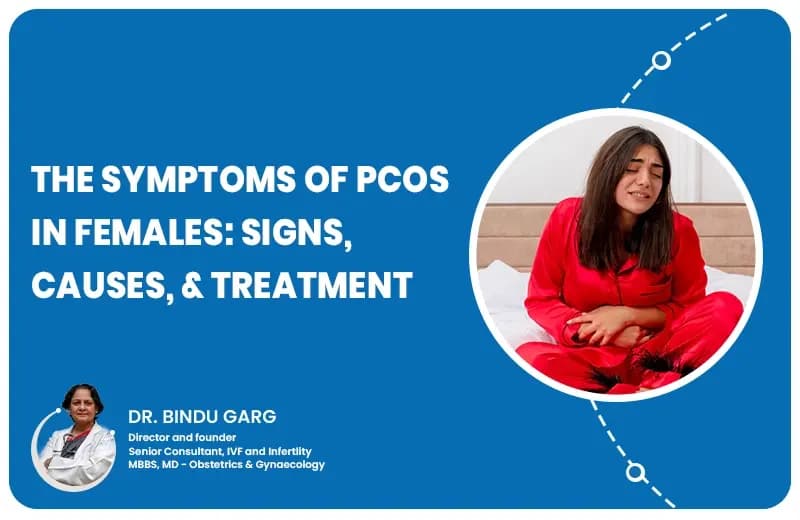
Recognize PCOS Symptoms in Women Causes and Treatment
Polycystic ovary syndrome (PCOS) is a common hormonal disorder that affects millions of women. Symptoms of PCOS in women can vary from person to person, but often include irregular menstrual periods, weight gain, and acne.
Many women with PCOS also face other symptoms such as increased facial hair growth, thinning hair on the scalp, and mood swings. It is important to recognize these symptoms early for proper diagnosis and treatment.
The exact cause of PCOS is not known, but it is often linked to hormone imbalances and genetics. Understanding the causes and symptoms can help manage this condition effectively.
In this blog, we will discuss the common symptoms of PCOS, its causes, and the treatment options available to help you better manage PCOS and improve your quality of life.
What is PCOS?
Polycystic ovary syndrome (PCOS) is a hormonal imbalance that affects the way a woman's ovaries work. It can cause irregular menstrual cycles, excess androgens (male hormones), and small cysts on the ovaries. PCOS affects up to 10% of women of reproductive age, making it a common but underdiagnosed condition.
If you want to know more about PCOS in detail then visit:-Polycystic Ovary Syndrome (PCOS)
Common Symptoms of PCOS in Females
Women with PCOS may experience a variety of symptoms. Here is a list of commonly observed symptoms of PCOS:
- Irregular Periods:One of the most common symptoms of PCOS is irregular or absent menstrual periods, often due to irregular ovulation.
- Excess Hair Growth (Hirsutism): Many women with PCOS develop excessive hair on their face and body, particularly on the chest, back, and abdomen.
- Acne: Increased androgen levels can cause persistent acne on the face, chest, and back.
- Weight Gain:Weight gain, especially around the abdomen, is a common symptom of PCOS.
- Thinning Hair:While excess hair grows in unwanted places, PCOS can also cause thinning of hair on the scalp or even baldness.
- Darkened Skin:Some women develop dark spots on their skin, especially in the neck folds, under the armpits, or on the waist.
- Ovarian Cysts:The ovaries may be enlarged and contain multiple small cysts.
- Fatigue: Feeling constantly tired is another common symptom of PCOS.
Causes of PCOS Symptoms
The exact cause of PCOS symptoms is unknown, but probably involves a combination of genetic and environmental factors. Here are some of the causes of PCOS symptoms:
- Insulin Resistance:Many women with PCOS have insulin resistance, which leads to increased levels of insulin in the body. This can cause the ovaries to produce more androgens (male hormones), which interfere with normal ovulation.
- Hormonal Imbalance:Excess of male hormones (androgens) is one of the major causes of PCOS symptoms. Androgens cause symptoms like acne, hair loss, and unwanted hair growth.
- Inflammation: Women with PCOS often have higher levels of inflammation in their bodies, which may contribute to the development of PCOS.
PCOS Symptoms and Treatment: How to Manage PCOS
While there is no cure for PCOS, its symptoms can be effectively managed with treatment. Early diagnosis and treatment can help reduce the risk of complications, including heart disease, type 2 diabetes, and infertility.
- Lifestyle Changes
Diet:A healthy diet is vital for managing PCOS symptoms. Focus on a balanced diet rich in fibre, lean proteins, and healthy fats. Reducing sugar and refined carbohydrates can help with insulin resistance and weight management.
Exercise:Regular physical activity, such as walking, swimming, or yoga, can help improve insulin sensitivity, reduce body fat, and manage PCOS-related weight gain. - Medical Treatment
Birth Control Pills:These are prescribed to regulate menstruation and reduce androgen levels, which can help with symptoms such as acne and excessive hair growth.
Insulin-Sensitizing Medication:Metformin, a drug used to treat type 2 diabetes, is commonly given to women with PCOS to improve insulin sensitivity and lower blood sugar levels.
Fertility Treatments:For women struggling with infertility due to PCOS, fertility treatments, such as ovulation-inducing medications (e.g., Clomid) or assisted reproductive technologies (ART) such as IVF, may help achieve pregnancy. - Weight Loss
Losing just 5-10% of your weight can make a big difference in reducing PCOS symptoms. It can help regulate your menstrual cycle, improve your body's use of insulin, and reduce androgen levels. It can also reduce facial and body hair growth, as well as reduce acne.
Read Also:-How Polycystic Ovary Syndrome (PCOS) Affects Fertility and How to Manage It
Polycystic Ovary Syndrome and Weight Loss
Weight control can be especially challenging for women with PCOS, as insulin resistance makes it more difficult to lose weight. However, weight management is important to reduce PCOS symptoms and prevent complications such as type 2 diabetes. Here are some tips to aid weight loss for women with PCOS:
- Eat Small, Balanced Meals:Focus on eating small, frequent meals throughout the day to keep blood sugar levels stable.
- Limit Processed Foods:Avoid sugary snacks, white bread, and processed foods, which can spike blood sugar levels.
- Incorporate Fiber:Fiber-rich foods like fruits, vegetables, and whole grains help control blood sugar and make you feel fuller longer.
Long-Term Effects of Untreated PCOS
If PCOS is left untreated, it can lead to many long-term health problems:
- Infertility:PCOS is one of the leading causes of infertility in women. Irregular ovulation makes it difficult for women with PCOS to conceive naturally.
- Type 2 Diabetes:Women with PCOS have a higher risk of developing insulin resistance, which can lead to type 2 diabetes.
- Heart Disease:PCOS is linked to several risk factors for heart disease, including high blood pressure, high cholesterol, and obesity.
- Endometrial Cancer:Irregular menstrual periods can cause the uterine lining to thicken, increasing the risk of endometrial cancer.
Managing PCOS Symptoms Naturally
There are also natural ways to manage PCOS symptoms:
- Herbal Remedies:Certain herbs, such as peppermint tea and cinnamon, may help lower androgen levels.
- Supplements:Supplements such as inositol and vitamin D have shown promising results in reducing insulin resistance and improving ovulation in women with PCOS.
- Mindful Stress Management:Stress can aggravate PCOS symptoms. Habits such as yoga, meditation, and mindfulness can help manage stress levels and improve overall health.
PCOS and Mental Health
Living with PCOS can affect mental health. Women with PCOS are more likely to experience anxiety, depression, and low self-esteem due to the physical changes and hormonal imbalances caused by the condition. It's extremely important to get help, whether that's through therapy, support groups, or talking to friends and family.
When to See a Doctor
If you notice any of the symptoms of PCOS in women, it is important to see a healthcare provider for an accurate diagnosis and treatment plan. Early intervention can help control symptoms and prevent long-term health complications such as diabetes, heart disease, and infertility.
Conclusion
PCOS is a common condition that affects many women, but its symptoms can be managed effectively with the right lifestyle changes and treatment options. If you recognise any symptoms of PCOS in yourself, it is important to seek medical advice early to prevent further complications. Remember, weight loss, regular exercise, and a healthy diet are important steps in managing PCOS symptoms. For people struggling with fertility issues, options such as medication or IVF may offer hope of conceiving.
AtDr.Bindu Garg's Clinicwe are dedicated to helping women manage their reproductive health and fertility. If you suspect you have symptoms of PCOS or need help with fertility, contact us todayto explore your treatment options.
Content Created By:

CyberBizz Technologies
Team - Content Curator